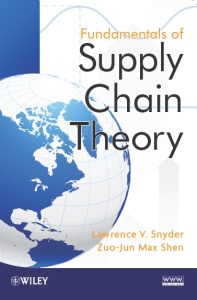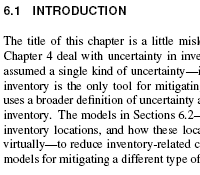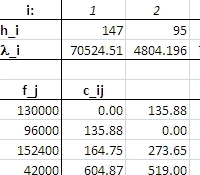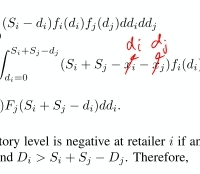Second Edition:
Comprehensively teaches the fundamentals of supply chain theory
This book presents the methodology and foundations of supply chain management and also demonstrates how recent developments build upon classic models. The authors focus on strategic, tactical, and operational aspects of supply chain management and cover a broad range of topics from forecasting, inventory management, and facility location to transportation, process flexibility, and auctions. Key mathematical models for optimizing the design, operation, and evaluation of supply chains are presented as well as models currently emerging from the research frontier.
Fundamentals of Supply Chain Theory, Second Edition contains new chapters on transportation (traveling salesman and vehicle routing problems), integrated supply chain models, and applications of supply chain theory. New sections have also been added throughout, on topics including machine learning models for forecasting, conic optimization for facility location, a multi-supplier model for supply uncertainty, and a game-theoretic analysis of auctions. The second edition also contains case studies for each chapter that illustrate the real-world implementation of the models presented. This edition also contains nearly 200 new homework problems, over 60 new worked examples, and over 140 new illustrative figures.
Plentiful teaching supplements are available, including an Instructor’s Manual and PowerPoint slides, as well as MATLAB programming assignments that require students to code algorithms in an effort to provide a deeper understanding of the material.
Ideal as a textbook for upper-undergraduate and graduate-level courses in supply chain management in engineering and business schools, Fundamentals of Supply Chain Theory, Second Edition will also appeal to anyone interested in quantitative approaches for studying supply chains.
Lawrence V. Snyder, PhD, is Professor in the Department of Industrial and Systems Engineering and Co-Director of the Institute for Data, Intelligent Systems, and Computation at Lehigh University. He has written numerous journal articles and tutorials on optimization models for supply chains and other infrastructure systems, with a focus on decision-making under uncertainty.
Zuo-Jun Max Shen, PhD, is Professor in the Department of Industrial Engineering and Operations Research and the Department of Civil and Environmental Engineering at the University of California at Berkeley. He is an INFORMS Fellow and has published and consulted extensively in the areas of integrated supply chain design and management, data driven decision making, and systems optimization.
First Edition:
An authoritative, quantitative approach to supply chain management
Addressing the need for the study of supply chain management to evolve at the same pace as its real-world practice, Fundamentals of Supply Chain Theory presents the methodology of the topic, discussing the foundations of this emerging supply chain theory and demonstrating how recent developments build upon classical models. The authors focus on long-term strategic location decision and tactical inventory planning for supply chain management, covering a broad range of topics from forecasting, inventory management, and facility location to process flexibility, contracting, and auctions.
Key mathematical models for optimizing the design, operation, and evaluation of supply chains are discussed, as well as models currently emerging from the research frontier. Following an introduction to the topic, the book delves into a discussion of centralized models such as:
- Forecasting and demand modeling
- Deterministic inventory models
- Stochastic inventory models
- Multi-Echelon inventory models
- Dealing with uncertainty in inventory optimization
- Facility location models
- Dealing with uncertainty in facility location
- Process flexibility
The authors go on to discuss decentralized models that involve multiple parties with independent, conflicting objectives, covering topics such as:
- The bullwhip effect
- Supply chain contracts
- Auctions
Each chapter concludes with a set of problems that challenge the reader to understand, interpret, and extend the models and algorithms presented. In addition, extensive appendices provide guidance on writing proofs and also outline helpful formulas relating to probability theory, calculus, and algebra.
Extensively class-tested to ensure an easy-to-follow presentation, Fundamentals of Supply Chain Theory is a suitable book for business and engineering courses on supply chain management at the graduate level. It also serves as an authoritative reference for academics and practitioners working in the areas of operations research, business, management science, and industrial engineering.
LAWRENCE V. SNYDER, PhD, is Associate Professor in the Department of Industrial and Systems Engineering at Lehigh University, where he also serves as Co-Director for the Center for Value Chain Research. He has written numerous journal articles in his areas of research interest, which include optimization models for supply chain management with a focus on models for the design and operation of robust and reliable supply chains.
ZUO-JUN MAX SHEN, PhD, is Chancellor’s Professor in the Department of Industrial Engineering and Operations Research at the University of California, Berkeley. Dr. Shen has published extensively in the areas of integrated supply chain design and management, practical mechanism design, and applied optimization.





